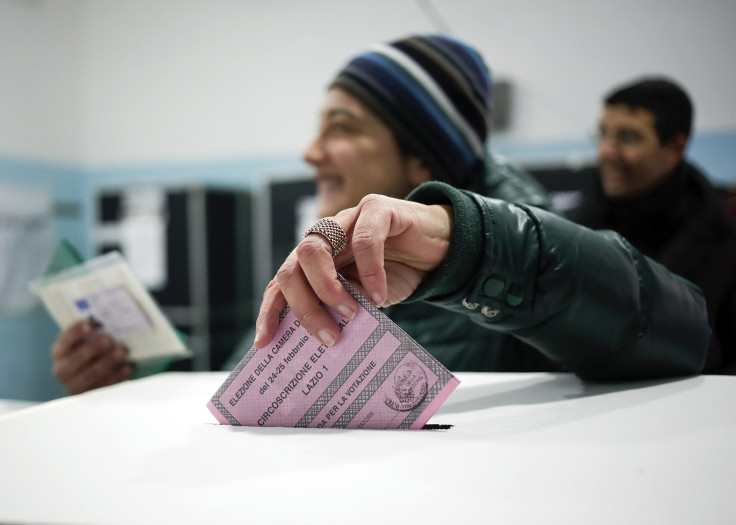Italy Elections 2013: Center-left Wins, Market Cheers, Berlusconi Alive And Well

Exit polls and early official tallies indicate that the center-left coalition led by Pier Luigi Bersani’s Democratic Party won a plurality of the vote in the Italian election, with 38 percent of the vote.
The center-right People of Freedom coalition headed by former Prime Minister Silvio Berlusconi made a surprisingly strong showing with 30 percent of the vote in the House, after he resigned in disgrace in November 2011 amid a financial crisis and allegations of personal misconduct. Berlusconi is currently a defendant in a trial focusing on his infamous “bunga bunga” parties, in which he is accused of paying a minor for sex and abusing his power to spring her from jail.
Italian electoral law gives extra seats in the House and Senate to the party or coalition that wins a plurality. According to Italian polling outfit Tecne, the Democratic Party and its left-wing ally SEL would have 340 seats in the House (the majority is 315), while outgoing Prime Minister Mario Monti’s Scelta Civica (Civic Choice) party, which polled around 8 percent and is often cited as a possible partner in a pro-Euro coalition with Bersani, would win 46. Berlusconi's party would get 140 seats.
Comedian Beppe Grillo’s anti-euro Five Star Movement, which advocated Italy’s exit from the common currency and according to some pre-voting polls would become Italy’s biggest party, would have 91 House seats.
A Bersani-Monti bloc would provide a solid majority in favor of reforms supported by the European Union.
Mario Spreafico, head of investments for the Italian arm of Schroders Private Banking, told Reuters “these are excellent numbers for the market” because “this majority may not be very strong but ensures relative stability.”
In a research note, research company Capital Economics said the numbers "suggest that the worst possible outcome of a long period of political deadlock has been avoided. Note too that Bersani is committed to meeting Italy’s existing fiscal goals and implementing further structural reforms."
Polls closed at 3 p.m. Italian time on Monday, 9 a.m. on the U.S. East Coast. Official results are expected late Monday evening or early Tuesday morning, local time, but the first official results have begun coming in for the Senate vote.
With a little more than 10,000 polling stations reporting out of 60,431, the center-left coalition is way ahead in the Senate vote count with 35 per cent, while the center-right has 27 percent. The Five Star Movement got 25 percent of the vote, while Monti got 9.
As early results came in, the Milan stock exchange’s FTSE MIB index gained of almost 3 percent, indicating the market was betting on a stable government rather than the shaky, short-lived coalitions that have been the norm in postwar Italy. Later, as projections seemed to indicate a smaller than originally reported victory for the center-left, Italian stocks pared gains; the FTSE MIB index ended the day with a 118-pont rise (+0.7 per cent).
Claudio Forleo and Valentina Beli of the IBTimes Italian edition contributed reporting for this story.
© Copyright IBTimes 2025. All rights reserved.






















